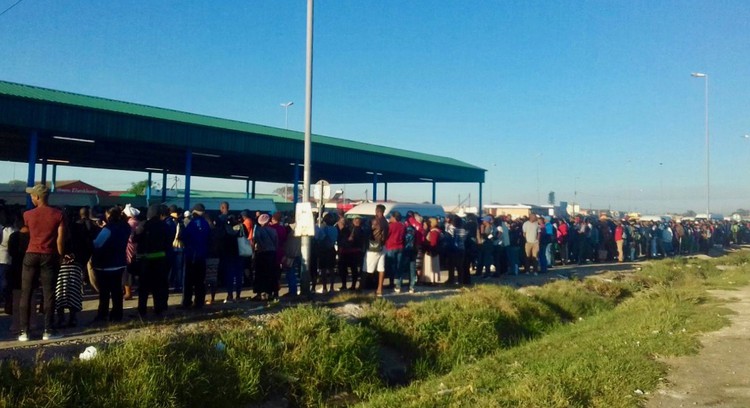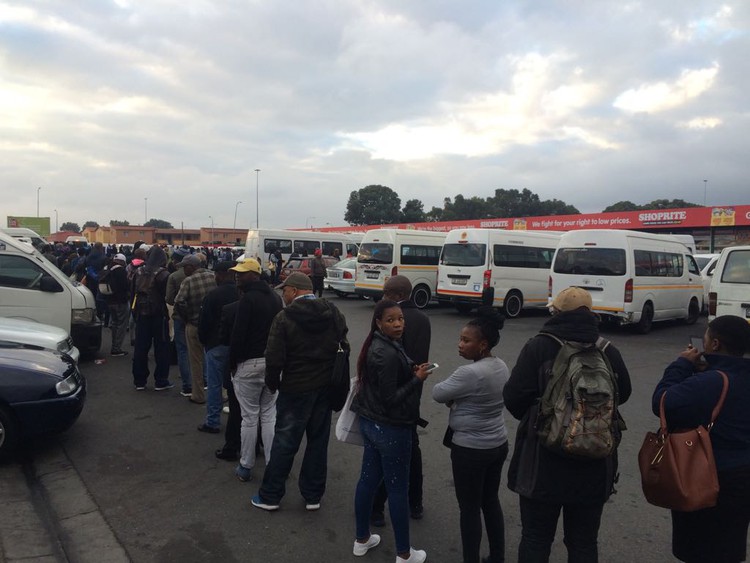
People stand in a long queue at Crossroad taxi rank in Port Elizabeth on Wednesday morning. Photo: Joseph Chirume
18 April 2018
Commuters across the country battled to get to work on Wednesday when bus workers went on strike.
The workers were represented by South African Transport and Allied Workers Union (Satawu), Tirisano Transport and Services Workers Union and the National Union of Metalworkers of South Africa.
About 80 workers picketed outside the Public Utility Transport Corporation (Putco) and Rea Vaya depots in Dobsonville Soweto, South of Johannesburg.
Bus workers’ salaries are negotiated at the SA Road Passenger Bargaining Council by the unions and the employer organisations, the Commuter Bus Employers Organisation and the SA Bus Employers Association. Negotiations started in January but have deadlocked and on 15 April the unions gave employers notice of their intention to strike.
Satawu spokesperson Phanuel Mbhombi told GroundUp the unions were demanding a 12% increase but the employers would only agree to 6.7%.
Algoa Bus Company CEO Sicelo Duze issued a press release on Monday saying that employers had offered a three-year wage increase of 7% in year one, 7.15% in year two and 7.5% in year three. “This has been rejected,” he wrote.
A union spokesperson said workers are willing to settle for a 10% increase and that negotiations will resume at 10am on Thursday.
Workers also want night shifts to be between 6pm and 6am instead of between 8pm and 3am, and they want changes to the dual labour system, where a second driver who is not at the wheel is paid a R400 monthly allowance. They want full pay for both drivers.
The union are also demanding compensation for nights away from home and decent accommodation for drivers. The current travel and subsistence allowance is R595 a day.
Xolile Dlamini, 50, has been a bus driver at Rea Vaya for two years.
“We work six days a week and it’s a hectic day. We wake up early in the morning to be at the depot by 4am. We then have to take the passengers to their work by 5am. It’s a strenuous job and we are not getting paid enough,” said Dlamini. She said she currently earns R9,400 a month.
“It’s too little because everything has gone up including VAT. I must make sure that I take care of my family and do everything as a mother but I can’t do that with the little money that I get,” said Dlamini.
Happy Sebalane, 33, has been a bus cleaner for two years. She currently earns about R6,000 and finds it hard to support her three children.
“We just earn the minimum. For example I earn the same amount of money as someone who started today, even though I’ve been working for the company for two years.”
She said she had not received an increase in salary since she started working for the company. “We only get increases when we go on strike like this, otherwise we would not be here today,” said Sebalane.
Transport unions say the bus strike will continue indefinitely until an agreement benefiting all workers is reached.

Bus customers rushed for trains or taxis to get to work on Wednesday.
A Khayelitsha resident working in Rondebosch stood at the Site C rank from 5:30am for two hours before catching a taxi to work. Normally she would make it in time to start her 7am shift but on Wednesday she arrived two hours later.
She has a weekly ticket that costs her R137 on a Golden Arrow bus but now she will have to spend R58 on a return trip using three taxis in the morning and two in the afternoon.
Her husband was still waiting at the taxi rank by 8:30am and had also been standing in line since 5:30am.
Golden Arrow said that 230,000 passengers used its buses daily.
In the city centre, GroundUp tried to interview frantic commuters. “I’m late, I’m late,” said Marc Lee as he got out of a taxi on his way to work. He said that it took him over two and a half hours to get to the city centre this morning. He arrived at Cape Town taxi rank at 7:45am. “I’m very late now. I left home [in Parkwood] at five this morning, waited for over half an hour at Wynberg taxi rank [where he switches taxis] and only arrived here now.”
Queues were long at Nyanga taxi rank. At 7:30am, a commuter who identified herself as Siki said she had been in the queue to get to Wynberg since 6am. “I will probably get to work around 10am because I am still at the back of this long queue and who knows what the roads look like. Maybe there is traffic. But I told my employer that I would be late, and he knows about the strike.”

A commuter from Gugulethu said he was worried about his Grade 10 nephew whom he left at home because there was no bus to get to school. “He buys a monthly bus ticket, he goes to Walmer High School and unfortunately there is no money for him to take a taxi to school. If this strike does not end, he might miss a lot of classes.”
Mumbles and complaints could be heard in the queues as people said they hoped that the strike would end on Wednesday. On the Claremont route in Cape Town there were too many commuters to fit in the taxis. This added more waiting time for commuters.
Cape Town commuter problems were compounded by Metrorail. At 8am the taxi rank at Mutual station in Pinelands was quiet. One commuter said this was because two trains to Cape Town on the northern line had been delayed by more than two hours.
Anele, 28, from Philippi told GroundUp that he had waited in line at the taxi rank near his home for over 30 minutes. “I got there after 5am and only got here after 7am. And now I’m waiting for the 6:50am train to come. There are no buses and the trains are delayed,” he said.
Byron McKenzie from Bonteheuwel said he usually travelled by bus to college in Pinelands but was forced to walk through Langa this morning. “It’s not that far to walk to Langa rank but it’s dangerous that time of the morning. When I got here they said class was cancelled so now I’m going back and have to walk from Langa into Bonteheuwel again,” he said.
Getting home may be even harder: it finally started raining hard in Cape Town on Wednesday afternoon, and although the city’s residents will welcome the rising dam levels, traffic on the already congested roads will move even slower.
In Port Elizabeth, thousands of people who depend on the Algoa Bus Company were stranded early on Wednesday.
Malibongwe Saini of Motherwell works in Newton Park. Though he works an afternoon shift, he had to go to work early today to avoid having to pay twice because the taxis only go straight from Motherwell to Newton Park in the morning. “In the afternoon I have to take two taxis.”
Margaret Jamhu is a domestic worker in KwaNobuhle,Uitenhage. She said though there was a direct bus from Motherwell to KwaNobuhle, there were no direct taxis. “I have to pay about R20 to Uitenhage town then R10 to KwaNobuhle, compared to Algoa Bus Company where the journey costs R13.”
There were long queues at the popular Crossroad taxi rank in Motherwell in the morning. School children were pushing to be first in the queues and heckling taxi marshals demanding priority.
Noluthando, who goes to school in New Brighton, said she was afraid of arriving late. “Our principal always locks out late comers. I pray the principal will understand our plight.”
But taxi driver Archie Mqumani is doing well off the strike: “It’s busy today as you can see. I am glad because I will be able to pay my monthly cellphone bill. I wish the situation could continue like this.”